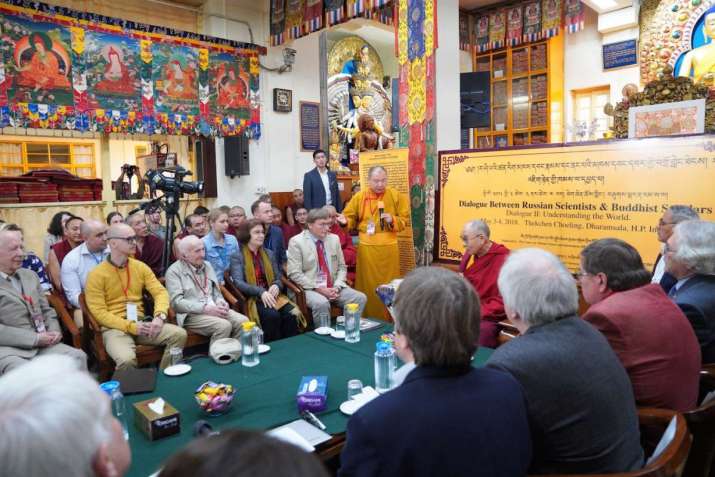Bust Nak wrote:
Swami wrote:
It is evidence that is based on events that are observed or experienced. Anyone can have this experience. In my case, I've taken an extra step by not only having an experience, but also replicating it, experimenting with it, and testing it.
Then by all means publish your work.
I am working on a book deal now. I use this and my lectures as my main support. This is one reason I'm offering my insight here for free instead of setting a payment for each discussion.
Bust Nak wrote:
I tried that, yet no religious experience. Is that enough to falsify your thesis? If not then please produce a more detailed method.
I don't agree with what you're saying. Even scientists have documented unique abilities that meditation leads to, like changes in brain structure, changes in neurobiological based behavior (previously thought to only react to drug therapy), changes in the field of awareness, and so on.
So why are you saying that meditation did "nothing" for you? This is how I can see truth from fiction.
Bust Nak wrote:
Swami wrote:Not every single part of the experience can be tested in a lab. I have presented the evidence that has been tested in the lab. I have a discussion on acquired savant syndrome. I've posted studies.
I saw that post, but what does savant syndrome have to do with religious experience?
It is an experience of omniscience. How do you know something at an expert level without having learned it? How would this knowledge come to you suddenly instead of always having it from birth? This all suggests that our brain or memory already knows everything and that we all just have to tap into it.
Bust Nak wrote:
Swami wrote:Science is also not about lab work but can also be about field research.
That much fine. I am also including that as testable in a lab. But I have a feeling you aren't thinking of the likes of Darwin observing birds in the wild.
Actually, my thinking is along the lines of Darwin's observations in the wild or that of any field researcher.
Bust Nak wrote:
Swami wrote:This is what scientists need to engage more of if they want to have a "direct experience" of consciousness as opposed to just relying on "correlates" or "indirect" methods.
How could the experience of one scientist be tested?
It can be tested but not in all of the ways that other subject matters are tested. Lets use transcendent or unitive experience as an example. First, to establish the ability of being able to transcend self or individual perspective I would require that an independent subject be able to have the same experience. Lets say that a small child, who knows little to nothing about unitive experience, goes through one, and reports the same types of details that the one scientists reports. A second point would be to be able to replicate the experience. You might say still say that these aren't being tested by outside observers, but that is the limitation of the subject matter - the subjective aspect of consciousness. If any third person test could be done it would be from studying the after effects or information that meditation leaves behind after
long term practice. For information, it would be knowing about something that would not be known about through ordinary means, like the mind of a person or even how to play a piano without learning (musical savants).
Even if you doubt me on the first two points then please explain to me how do you have a "direct" experience of consciousness. To date, scientists do not know how to directly observe consciousness from third-person. Can you imagine that consciousness is the most readily available phenomenon but yet they have never observed nor explained it?
Bust Nak wrote:
Swami wrote:The experience I described earlier was personal but it's one that many have reported and that many more can experience for themselves. This is how NDEs came to be accepted by scientist. Perhaps it started out as a few accounts but then many came out, including children, reporting the same experience and now the NDE is accepted.
Accepted by whom? Certainly not the scientific consensus.
NDEs are accepted by scientists. What is not a scientific consensus is the validity of these NDEs, that is, whether they are hallucinations or real objective events.
Bust Nak wrote:
Swami wrote:To add to my insight, I would even say that meditation itself should be considered as part of the scientific method. Unlike introspection which has seen acceptance and rejection from the scientific method, meditation is growing in interest. Also unlike introspection (which leaves the "mind" in place to potentially distort), meditation removes mind from picture leaving little room for distortion. It allows you to experience reality as it is.
It might be a good way of generating a new thesis, but it fails as a way to test a thesis.
What you're basically arguing or disagreeing with me on is that my method is different than some standard science, and therefore it's not a test.
You are getting away from the spirit of science. The spirit of science is to be "objective" - perceiving reality as it is. This does not require that all methods be uniform across all scientific fields. Believing that all science branches share one standard set of scientific method or approach is a myth because each science has specialized methods. What I'm proposing is a "specialized" method.





